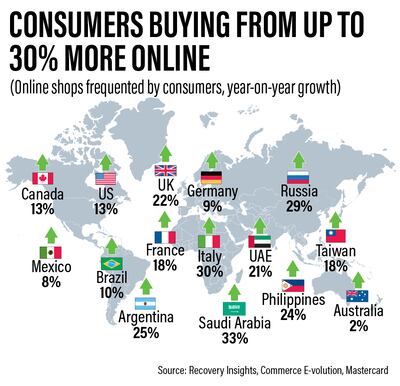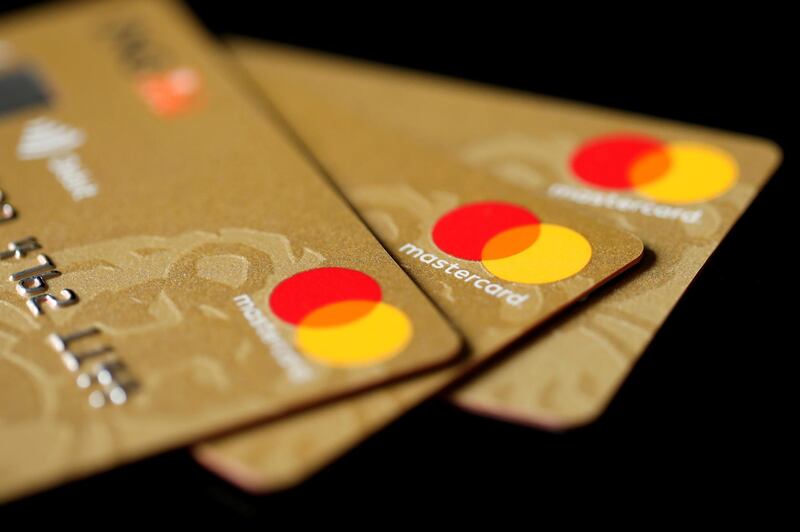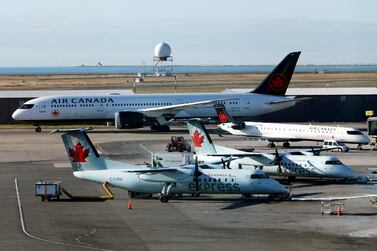Consumers across the world spent an additional $900 billion shopping online last year as the Covid-19 pandemic restricted access to physical shops, according to Mastercard.
E-commerce accounted for about $1 of every $5 spent on retail last year, up from about $1 out of every $7 spent in 2019, the credit card company said yesterday.
“While consumers were stuck at home, their dollars travelled far and wide, thanks to e-commerce,” said Bricklin Dwyer, the company's chief economist and head of the Mastercard Economics Institute.
“This has significant implications, with the countries and companies that have prioritised digital continuing to reap the benefits ... even the smallest businesses see gains when they shift to digital.”
The Covid-19 pandemic drove a transformation in spending habits across the GCC, where consumers traditionally purchased products in person and usually with cash.
Now, shoppers are going online more as the pandemic hastens a retailer shift towards digital shops.
Globally, online shopping has given retailers, restaurants and other businesses a much-needed lifeline after in-person consumer spending was disrupted.

Between 20 per cent and 30 per cent of the world's pandemic-related shift to digital shops is expected to be permanent, according to Mastercard’s Recovery Insights: Commerce E-volution report.
It said the shift was already well under way in certain markets such as the UAE and the US, as well as in countries such as Egypt and Brazil that were in the early stages of their digital retail transition.
In the UAE, the increase in online consumer spending was mainly driven by a 21 per cent annual jump in the number of online shops, in addition to a 44 per cent annual surge in the number of high-volume e-commerce trading partners last year.
Residents in countries such as Italy and Saudi Arabia are buying from 33 per cent more online shops on average, followed closely by Russia at 29 per cent, the UK at 22 per cent and the UAE at 21 per cent.
In the Middle East, the e-commerce market share pre-crisis was 2.2 per cent but grew to 4.6 per cent at the peak of the pandemic, the report said.
Globally, the shift to digital has differed due to geographical, economic and household factors.
However, essential retail sectors such as groceries and discount shops, which had the smallest digital share before the crisis, recorded some of the biggest gains.
With new consumer habits forming and given the low pre-pandemic user base, Mastercard expects that 70 per cent to 80 per cent of the online grocery shopping surge worldwide will “stick around for good”.
Global spending on cross-border e-commerce grew by about 25 per cent to 30 per cent between March 2020 and February 2021, the report said.
Consumers worldwide are also making purchases from a greater number of websites and online marketplaces than before, buying from up to 30 per cent more online retailers, the report said.
Agility is important for small businesses as online shopping trends evolve. For every $1 spent at a large restaurant chain, between 70 cents and 75 cents was spent at a small restaurant, representing a significant opportunity for those who can adapt, it said.
Mastercard estimates that Covid-19 lockdowns hastened the transition from cash to digital payments within physical shops in the US by a year.
“The pandemic may be the purest test of the world’s progress towards digitisation to date, proving in the starkest possible terms how dynamic digital economies have been most resilient to the economic turmoil and are best positioned for future growth,” said Bhaskar Chakravorti, dean of global business at The Fletcher School at Tufts University.
“2020 is behind us, but there is no doubt the increased number of people who were pushed to go online, in droves as never before, has changed the retail landscape for the long run,” said Mastercard.








